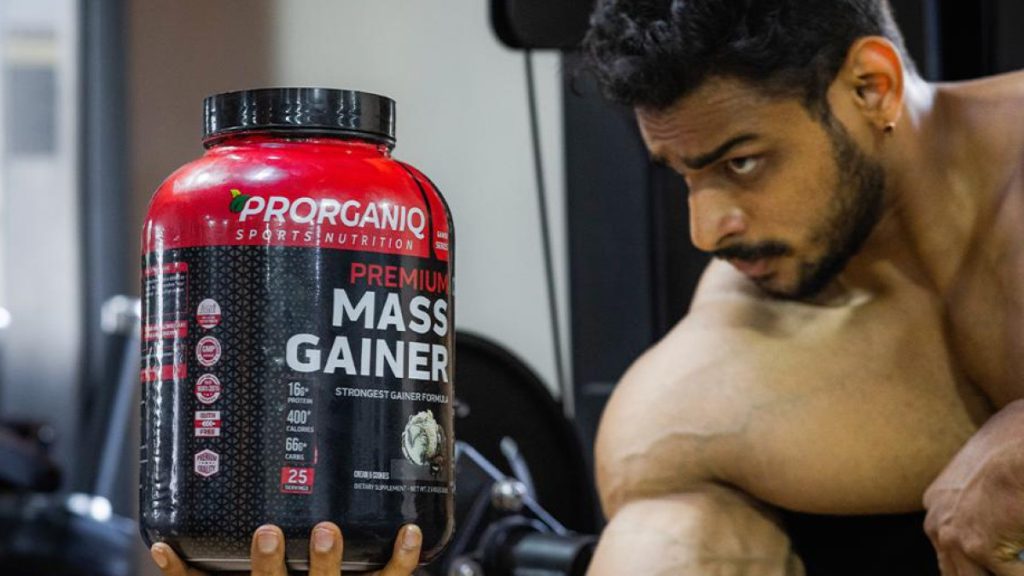Vitamins & Supplements
Everything You Need To Know About Mass Gainers
Bold claims and lofty promises are a hallmark of the supplement industry today. From fat burners to pre-workouts, many products promise to deliver extraordinary results in a timely manner, from “shredding fat” to “packing on lean muscle.” The hard part for consumers is separating the merit from the marketing.
Mass gainers are no different than other supplements out there. While they have a clearly stated goal of helping people pack on pounds, it’s critical to dive into how they work, if and why they’re effective, and what the general population and athletes alike should consider if they’re interested in adding mass gainers to their supplement plan.
What are Mass Gainers?
Mass gainers, also commonly called “weight gainers”, are a type of protein powder designed specifically (and unsurprisingly) to help you gain weight. With their ample calorie counts, they aim to help add muscle in ways that ordinary protein supplements can’t, and are often marketed as a solution for so-called “hardgainers.” With that in mind, let’s take a deeper look into what this kind of supplement really has to offer and whether it’s right for you.
Common Formulations & Nutritional Content
While mass gainer products do bear some resemblance to many common protein powders, there are some key distinctions that separate their formulation and function.
Mass gainer products will almost always contain far more calories, protein, and carbohydrates than standard protein powders. These extra nutrients are critical for adding body mass.
Caloric Content
The defining feature of all mass gainers is the high caloric content, which is essential for gaining weight. Many mass gainers contain upwards of three times more calories per serving than a standard protein powder. The high number of calories is the driving factor behind the results these products solicit, but more isn’t always better — the line between maintenance and gain is a tight one.
Carbohydrate Content
Unlike most standard powders that get most of their total calories from protein, the extra caloric content in mass gainers comes predominantly from added carbohydrates. Maltodextrin, corn syrup, and other sugary extras can be found in abundance here as they are easily digested without making the powder too thick or unmixable.
Fat & Other Additives
While not present in such dense quantities as carbohydrates, the fat content in most mass gainers is markedly higher than standard protein powders, mostly coming in the form of dairy additives. A high amount of cholesterol and sodium are also worth mentioning, although that tends to be part and parcel of any dietary product with a high calorie count.
Added Nutrients
The hallmark feature of a good mass gainer is a high calorie count, but that doesn’t necessarily mean they’re all nutritionally vacant. Some brands include beneficial additives such as vitamins, BCAAs, creatine monohydrate, etc., that help offer a more complete dietary package.
A Primer on Energy Balance
Before we look into the effectiveness of mass gainers, it’s important to understand their purpose as a supplement, and to do that requires an overview of the metabolic processes involved in weight loss or gain.
Energy balance is pretty straightforward. Between natural body functions and external activity, you expend a certain number of calories per day. If you take in more calories than you expend, you will gain weight. If you take in fewer, you will lose weight.
The quality of weight you gain or lose depends largely on your macronutrient composition and type of activity, while the quantity of weight change is almost entirely dependent on caloric intake. The thesis is simple; the more calories you take in, the more weight you’ll gain. And this is the main selling point of any mass gainer supplement.
However, more isn’t always more. Adding substantially more calories or protein to your diet may not always produce better results; there may be serious diminishing returns if weight gained is more likely to be from body fat than lean muscle. (1)
Does this mean that mass gainers are a redundant supplement that has no place in anyone’s cabinet? Not at all. Now that we understand what they are and how the body processes weight gain and loss, let’s look at who can benefit from the use of a mass gainer.
The Benefits of Mass Gainers
Mass gainers have one substantial benefit; they offer a convenient method of consuming a high number of calories, with decent macro splits, quickly. For anyone struggling to gain weight due to logistics, budget, or biology, mass gainers offer a viable solution. That is, assuming a substantial amount of calories in your diet still come from whole food sources.
If you struggle to hit your calorie goals every day due to financial or time constraints, but still want to make sure you’re eating enough to make progress in the gym or on the scale, a mass gainer could be helpful for you. The calorie content per dollar is generally a great deal, and they work wonders if ingested shortly after an intense workout when the body is primed to utilize protein and calories in a productive way.
It is also worth touching on the “hardgainer” stereotype — a person whose metabolism is uncommonly high and does not respond as expected to moderate increases in caloric intake. While some regard this as a myth, it does have some credibility in the literature. Greg Nuckols, M.A. in Sport Science and editor of the MASS Research Review, shared his thoughts on the topic:
“When people go into caloric surpluses, there are compensations that occur as the body tries to stay more-or-less at maintenance,” Nuckols says. “There may be slight increases in metabolic rate, but the larger compensations come in the form of increases in non-exercise activity thermogenesis (NEAT). Some people have small increases in NEAT in a caloric surplus, and other people have large increases. These compensatory increases in NEAT might just make it harder to actually achieve a notable caloric surplus, especially if you don’t have a big appetite.”
While this topic has not been exhaustively studied and researched, Nuckols’ sentiment does lend some credence to the idea that a select portion of the population may have issues gaining weight despite following an appropriate “bulking” plan. If you find yourself in that position, a mass gainer may be especially helpful for you.
Who Doesn’t Need Mass Gainers
While mass gainers offer cheap calories, there are some factors worth considering. No over-the-counter supplement can magically add lean mass on its own. If you take the marketing at face value, you’ll likely end up disappointed. Mass gainers are a high-calorie protein and carbohydrate source, not a magic bullet.
Furthermore, the ingredients of most common mass gainers do contain some red flags for some populations. A large portion of the calorie content does tend to come from maltodextrin and other additives. This may be a dealbreaker for anyone with diabetes or those wishing to avoid high Glycemic Index (GI) sugars. It also goes without saying that mass gainers are generally incompatible with a ketogenic diet, which shuns carbs in favor of high-protein, high-fat macros.
Common additives also include egg, soy, and whey products that may be problematic for the lactose intolerant. Many also boast a relatively high-fat content, which slows the absorption of protein and thus may be suboptimal when taken shortly after a training session.
Essential Components for Effective Weight Gainer Supplements:
The weight gainers consist of all macro and micronutrients such as Proteins, Carbohydrates and fats, Vitamins and minerals, which help to bring an entire set of nutrients in one drink. Now let us have a look at the essential components of an effective weight gainer supplement.
Calories: Calories play a critical role in the process of weight gain, as the surplus calories consumed daily are stored as fat. Insufficient caloric intake due to an inadequate diet can result in a lean and fragile physique. Hence, it is important for weight gainer supplements to contain a substantial amount of calories.
Proteins: Proteins play a vital role in the body’s repair mechanism. Natural forms of protein, such as whey protein and milk protein, are particularly beneficial for bodybuilders as they aid in increasing muscle mass. Additionally, protein is instrumental in facilitating post-exercise recovery.
Carbohydrates: Complex carbohydrates are a type of carbohydrates that are beneficial for metabolism, as they take longer to digest compared to simple carbohydrates. This slower digestion helps in reducing the overall metabolic rate. Complex carbohydrates include rice powder and oat powder, known for their ability to provide sustained energy levels throughout the day. Additionally, complex carbohydrates contain soluble fibre, which offers advantages such as lowering glucose and cholesterol levels.
Creatine: Creatine is widely recognized for its positive impact on exercise performance and muscle strength. It is commonly utilised to enhance athletic abilities and facilitate improvements in physical performance. Furthermore, creatine has been found to aid in relaxation and promote faster recovery from fatigue. It is important to note that the International Olympic Committee permits creatine usage.
Side effects of Weight gainer supplements:
When incorporating weight gainer supplements into your routine, it is crucial to engage in regular exercise to promote optimal muscle gain. Simply consuming these supplements without physical activity can result in excessive weight gain primarily attributed to fat accumulation. Consulting a healthcare professional before the consumption of any health supplements is highly recommended to ensure suitability and address individual needs and concerns.


